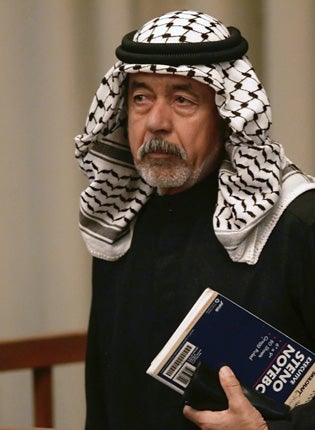'Chemical Ali', the killer of 5,000 Kurds, is executed
Most brutal of Saddam's henchmen hanged on the same day that suicide bombers kill 36 at Baghdad hotels

Your support helps us to tell the story
From reproductive rights to climate change to Big Tech, The Independent is on the ground when the story is developing. Whether it's investigating the financials of Elon Musk's pro-Trump PAC or producing our latest documentary, 'The A Word', which shines a light on the American women fighting for reproductive rights, we know how important it is to parse out the facts from the messaging.
At such a critical moment in US history, we need reporters on the ground. Your donation allows us to keep sending journalists to speak to both sides of the story.
The Independent is trusted by Americans across the entire political spectrum. And unlike many other quality news outlets, we choose not to lock Americans out of our reporting and analysis with paywalls. We believe quality journalism should be available to everyone, paid for by those who can afford it.
Your support makes all the difference.Iraq yesterday executed by hanging Ali Hassan al-Majid, Saddam Hussein's chief enforcer and supervisor of mass killings, also known as "Chemical Ali" for using chemical weapons to kill tens of thousands of people.
He was the cruellest and most violent of top Iraqi leaders under Saddam Hussein, his first cousin to whom he was wholly loyal. He had already been sentenced to death four times, most recently earlier this month for the killing by poison gas of 5,000 Kurdish civilians at Halabja in 1988.
His execution was announced as suicide bombers driving vehicles packed with explosives blew themselves up close to three hotels in Baghdad killing at least 36 people and wounding 80. The attacks show that insurgents, most probably from the Iraqi branch of al-Qa'ida, have the capability to penetrate the centre of the capital despite many army and police checkpoints.
Clouds of smoke rose over Baghdad as blasts echoed across the city in the space of 15 minutes in the afternoon. The first blast hit the car park of the Sheraton, used by businessmen and journalists that overlooks the Tigris River. The al-Hamra hotel, where many Western newspaper and television reporters are based, was also targeted, as was the Babylon, which is used more by Iraqis than foreigners.
It is unlikely that the bombings were in retaliation for Mr Majid's execution which had only just been announced. They were in keeping with the strategy al-Qa'ida developed last year of carrying out occasional bombings against high profile targets chosen to generate the maximum publicity, cause the greatest alarm, show that the government has not restored security in Baghdad as fully as it claims and weaken Prime Minister Nouri al-Maliki.
The only surprise about the hanging of Saddam's former henchman is that it took so long to happen. Mr Majid was probably the most feared and hated member of the Baathist regime and was captured back in 2003. But the Iraqi government wanted to try him for more than one of his crimes, which rival those of the Nazis in Eastern Europe in the Second World War.
His greatest atrocities were in 1988 when he directed the Anfal extermination campaign against Kurdish civilians when every human being in designated areas was slaughtered. The final death toll is put at 180,000, hundreds of thousands more were deported or imprisoned and 3,800 villages destroyed. A head of the Northern Bureau of the Baath Party, Mr Majid directed these massacres and his orders are explicit in tape recordings of his telephone calls.
Kurds yesterday welcomed his death. "I'm very happy with the execution. This is one of the few happy days for the Kurdish people," Jeno Abdullah, a postgraduate student in Sulaimaniya told Reuters, although he was sceptical about the timing of the hanging, just six weeks before the Iraqi polls.
Born in 1941 in the Sunni Arab province of Tikrit north of Baghdad, Mr Majid owed his power entirely to his family relationship to Saddam Hussein. Poorly educated, Mr Majid was at one time an army driver and motor cycle dispatch rider, but after the Baath party seized power in a coup in 1968 Saddam sought to give his relatives complete control of the security apparatus.
Mr Majid was, at different times, the head of intelligence, defence minister and interior minister. He reinforced his reputation for mindless brutality as governor of Kuwait after the Iraqi invasion in 1990. He was in the forefront of suppressing the Shia rebellion in the wake of the Gulf War in 1991 when up to 150,000 people may have been killed. He also helped suppress the smaller uprising in the wake of the assassination of the Shia religious leader Mohammed Sadiq al-Sadr in 1999. He received separate death sentences for these killings. Unlike Saddam's execution in December 2006 when insults were heaped on him at the gallows, Mr Majid was not subjected to any abuse, according to a government spokesman. "Everyone abided by the government's instructions and the convicted was not subjected to any breach, chanting, abuse words, or insults," the spokesman said.
Join our commenting forum
Join thought-provoking conversations, follow other Independent readers and see their replies
Comments